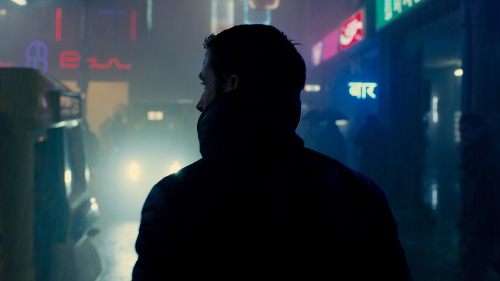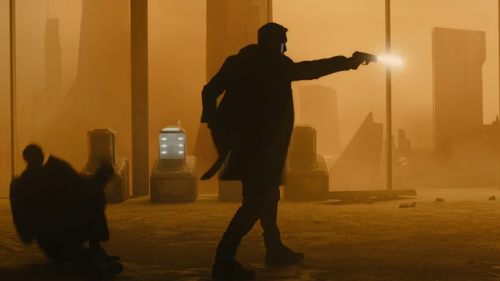The Complete Cinematic Philip K. Dick
Get your tickets to Blade Runner 2049 here!
Blade Runner 2049 marks the thirteenth feature film* adapted from the novels, novellas and short stories of Phillip K. Dick. These films include influential genre classics, indie curios, studio blockbusters and passion projects, brought to the screen by filmmakers ranging from auteurs through journeymen to novices, but their shared derivation from the works of a single writer affords an opportunity to examine some of the choices made in adapting literary works to the screen without the need to consider wildly different authorial voices.
Just why is Dick’s work so frequently adapted? Little-known outside the SF community during his lifetime, his career falls into three distinct phases: establishing himself as a writer of conventional pulp SF; perfecting his distinctive voice and establishing the quintessentially Dickian themes; coming to terms with his use of drugs, mental health problems and a series of quasi-religious experiences. Throughout this, he eschewed hard SF’s preoccupation with the nuts and bolts of his flapples and time scoops, concentrating instead on the very human dilemmas of characters who aren’t tentacled aliens, cybernetic supermen, genius scientists or chisel-jawed space captains, but relatable everymen: clerks, cops and technicians living in familiar-feeling cities and suburbs sprinkled with futuristic technologies who find themselves caught up in propulsive action and dramatic conflict as they fight or elude tormentors and pursue goals and answers, the fabric of reality shifting beneath them all the while.
At the same time, Dick’s premises make for straightforward elevator pitches: a bounty hunter grapples with his own humanity while pursuing illegal androids; a lowly clerk discovers his secret agent fantasies are really buried memories; a narcotics agent becomes an addict and loses his mind as he investigates his alter ego. Fundamentally, Philip K. Dick’s writing has an audience-pleasing accessibility and timelessness which both admits and blends SF’s facile, pulpy, abstract and literary sides, yet appeals to filmmakers with its mixture of visual freedom and complex intellectual and moral themes, and the resulting adaptations can be considered in three broad groups.
First are those films which adapt the wealth of material found in longer narratives. A Scanner Darkly takes few liberties with Dick’s novel as it condenses characters and streamlines events in pursuit of a more rigid narrative structure, preserving whole scenes intact and passages of dialogue word-for-word. Using a mixture of dream sequences, voiceovers and flashbacks to access its characters’ inner monologues, it neatly captures the novel’s tone and humorous melancholy, using a distinctive rotoscoped aesthetic to invoke the drugged-out haze of its characters’ lives. In contrast, Dick’s dense Do Androids Dream Of Electric Sheep? is not only given a new title but shorn of whole characters and narrative strands, becoming a more abstract visual experience which rewards interpretation of the purely visual representations of its more complex concepts while standing at the nexus of hard-boiled detective fiction, film noir and science fiction. By emphasising the more cinematic elements of the novel, Blade Runner retains its central themes and world-weary feel, complemented by the hugely influential future noir aesthetic and tone which Dick himself immediately recognised and applauded as being both of a piece with his own interior world and a vindication of his work. Lastly in this group, Radio Free Albemuth very literally adapts a semi-autobiographical novel based on esoteric religious experiences which was ultimately abandoned by its author. This might not be considered the most promising starting point for a film, let alone one from a first-time director on a microbudget, and that authenticity means it also inherits the novel’s intrinsic flaws and completist-only appeal.
In the next grouping are films based on less complex, shorter Dick works which add additional material in order to expand them to feature length. Total Recall† is a quintessential SF action film, one tailored to the strengths, weaknesses and persona of its star, and by dropping Martian imagery and telepathic mutants from unrelated Dick works into a gloriously lurid pulpy romp, the film complements Dick’s novella We Can Remember It For You Wholesale by portraying events only hinted at on the page, wrapping its more complete narrative in a further layer of Dickian shifting reality to the extent it can be viewed as taking place entirely within its counterpart even as it repackages Dick’s themes for the blockbuster audience. More simply, Screamers adds an audience surrogate character to an adaptation of Second Variety which is otherwise notably faithful to the source material, making only marginal changes to the story but taking advantage of the running time to further develop its characters, and by shifting the action from a post-apocalyptic Earth to a desolate alien world better suited to its budget the screenplay frees up resources for production design evoking Dick’s descriptions of the various varieties of robot killing machines. Impostor, however, originally intended as a segment of an anthology movie, finds itself extended almost to breaking point as a feature film: the elegant mechanics and philosophy of Dick’s simple story remain intact, but become the bookends of an extended chase through a dystopian underworld which serves the action imperative and bulks out the footage, but fails to mesh with any other part of the story.
The final group are adaptations in which the filmmakers take Dick’s work and use it as the kernel of, or framework for, their own story. Meeting the predilections of both its star and director brings Minority Report to a conclusion diametrically opposed to that of The Minority Report, the moral calculation and predestination at the heart of Dick’s short story set aside in favour of a more propulsive SF action film with its own dense thematic agenda powered by exemplary filmmaking. Between its meticulously-realised future, distinctive aesthetic and reworked narrative, Minority Report enters into a broader dialogue with Dick’s work in both original and adapted forms that only emphasises its inherent adaptability while rejecting its details and thesis. Picking up the fate versus free will theme abandoned by Minority Report, The Adjustment Bureau expands upon its source material by injecting it into a lighthearted but intelligent modern romantic drama which, while largely spun from whole cloth, feels of a piece with Dick’s Adjustment Team, particularly in the 50s styling of its “angels” and reworking of the story’s key scene of an interrupted reality adjustment. In adding a rounded female character the film addresses an oft-cited shortcoming of Dick’s own writing and is able to reach a much more cinematic conclusion than his short story. While the exquisite clockwork plotting of Paycheck survives adaptation more or less intact, it is overwhelmed by every subsequent choice, the narrative’s solutions to the short story’s problems introducing problems of their own as the film seeks broader box office appeal. Equally prey to commercial considerations, Next strays so far from The Golden Man it becomes a textbook example of a screenplay eliminating so much source material during the development phase as to become virtually unrecognisable as an adaptation, and might as well be an original screenplay. In changing the plot’s central threat from the mutant himself to a terrorist gang he thwarts, Next becomes a contemporary film reflecting the real-life tension between civil liberties and the prevention of terrorism, but the short story’s point is lost along the way.
They may share certain motifs – eyes, hats, men on the run, interrogations, visions of the future and dreams of the past – but these films vary equally in terms of artistic, critical and commercial success, underlining the simple truth that the adaptation has no automatic advantage or disadvantage over the original screenplay. Furthermore, there’s no magic bullet to be found in bringing a literary work to the screen: every source work poses unique problems to be solved before a finished film can be put into the inscrutable black box which sorts cinematic success from failure.
The choices made on that path to adaptation are influenced by many factors, but it all starts with a single choice: a filmmaker reading that story, finding something within in that resonates with them and determining to share it with the world. Telling stories has always meant retelling them: tailoring them for an audience, filtering them through individual perspectives and experiences, updating them for the times, translating them into different languages and media. Film is simply the most recent new medium, and it still has a deep well of stories to tell and retell, some of which will undoubtedly be found in the prolific, strange, yet deeply human writing of Philip K. Dick.
*A review copy of Confessions d’un Barjo has proven elusive, hence its omission from this analysis.
†2012’s Total Recall removes the Martian elements of the plot entirely, becoming more a reimagining of the 1990 film than an adaptation of Dick.



